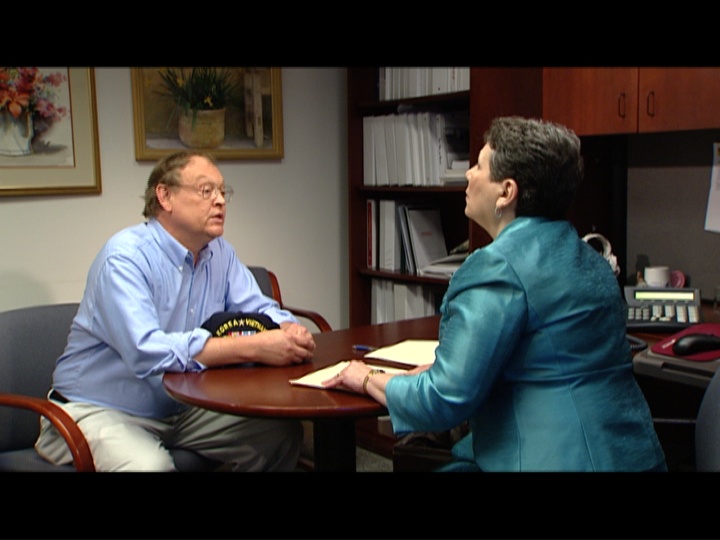
VIST Coordinator Evelyn Cabrera-Heatwole works with a patient at the Richmond VA Medical Center in Virginia.
When I meet blind Veterans for the first time, often the first thing they ask me is, “Do you know my VIST coordinator?” Usually, they go on to tell me some great thing that happened: how their coordinator arranged care for them, solved a knotty problem in the medical facility, helped them get a benefit they were not aware of, helped them and their families through a trying time of adjustment, or even changed their lives. There are also the occasional—but rare—complaints.
“VIST” stands for Visual Impairment Services Team. The VIST coordinator establishes and oversees the work of this team—composed of VA medical and rehabilitation professionals— at a VA medical facility; they work together to ensure that blind Veterans receive good care in their respective VA facilities.
The VIST program began in 1967, and was designed to assure that personal contact is made with each blinded Veteran in the VIST catchment area, to arrange periodic reviews of their medical conditions and needs.
There are currently 164 VIST coordinators in the Veterans Health Administration. They cover more than 200 VA medical centers and community-based outpatient clinics, and through their caseloads, provide care for more than 50,000 blind Veterans. VIST coordinators are case managers who have the responsibility of coordinating care and services for severely disabled, visually impaired Veterans, as well as for Servicemembers receiving care from VA. The coordinator’s duties include providing and arranging treatment to enhance blind Veterans’ functioning and adjustment. They arrange for Veterans to receive care in VA blind and vision rehabilitation clinics, from specialists who provide care in homes and communities, and from the inpatient blind rehabilitation centers. They inform and educate the family members and significant others of blind Veterans to help them understand the disability of blindness—what it is and what it does—because blindness happens, not just to the Veteran, but to family, friends and the community, too. Additionally, through their role, VIST coordinators provide outreach to locate those Veterans with a severely disabling visual impairment who are not receiving VA care and assist Veterans through counseling and problem resolution. They can also recommend that Veterans be assessed for guide dog services.
Some VIST coordinators are educated and experienced in counseling, while others have their background in blind rehabilitation. Through either of these channels, VA professionals provide very important and needed services; they are there to assure blind Veterans get “the best care anywhere.”
Learn more about VA’s Blind Rehabilitation Services at: http://www.va.gov/blindrehab/.

Topics in this story
More Stories
The Social Security Administration is hoping to make applying for Supplemental Security Income (SSI) a whole lot easier, announcing it will start offering online, streamlined applications for some applicants.
Yusuf Henriques, an Army Veteran and former combat medic, is the founder and CEO of IndyGeneUS AI, a genomics company on a mission to improve health equity by increasing representation of women and racial minorities in clinical trials.
Online shopping scams are the riskiest scam for Veterans, with 77.3% of reports confirmed losing money when targeted by this scam.







Don’t forget all those hardworking Blind Rehab Outpatient Specialists who do all those home visits and work with the VIST to provide services
thank you to all VIST coordinators.Karen Bays Petty helped in south carolina me at Charleston va hospital in south Carolina.she transferd to texas I cant thank her enough she is a caring person.i now see Vickie at charleston she also is very caring and helpful.
U know blind leads the blind. Starting with the director who run madison wi va to the p/a were vets make complaints goes no where. And health care hit rock bottom . when 5 five drs retired from their since Feb.